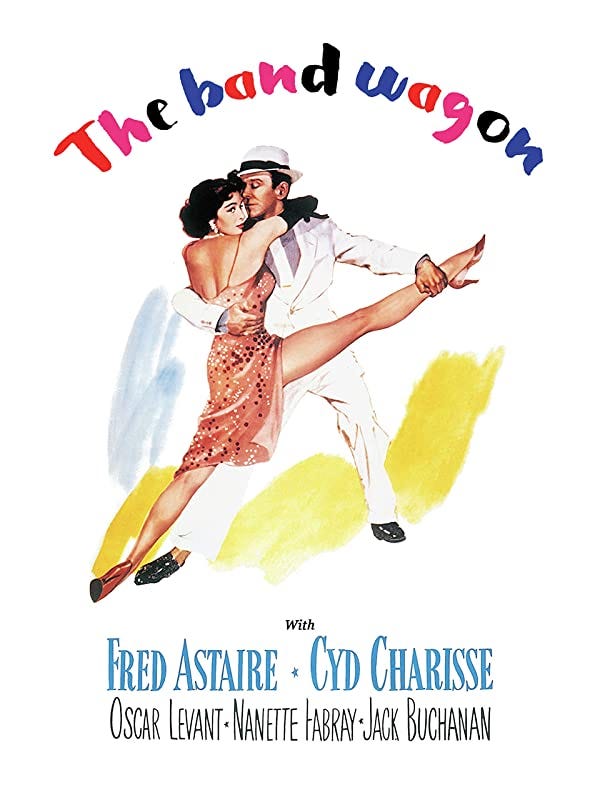"The Band Wagon" (1953)—Join The Fun!
+Guest Posts: Movie Wisdom By Guest Writer Mike Baron—Issue #3
Image by moviewise from RedBubble
The Movie:
The Band Wagon (1953) is a comedy directed by Vincente Minnelli about Tony Hunter (Fred Astaire), a Hollywood actor who agrees to star in a play written by his friends Lester (Oscar Levant) and Lily Marton (Nanette Fabray) and co-starring director/producer Jeffrey Cordova (Jack Buchanan), who changes the original script into a modern retelling of Faust and adds a prima ballerina, Gabrielle Gerard (Cyd Charisse), to the cast.
Life Lesson: Art does not have to be serious.
Jeffrey Cordova: Show me the greatest tragic actor or the lowest red-nose comic in burlesque and I’ll show you an entertainer. We’re all entertainers.
Guest Writer:
Guest writer Mike Baron discusses writing, biking & music in: Mike’s Newsletter
I can’t remember my first musical. It was probably The Music Man (1962). If so, it was a propitious beginning. Musicals reigned in Hollywood from the thirties through the sixties. Today, they’re on life support. Producers no longer believe in pure entertainment. Message films win Oscar gold, and oh, how they lust after Oscar. Nevertheless, some gems have appeared recently, including the fourth remake of A Star Is Born (1937), and La La Land (2016). The brilliant British stealth musicals Hear My Song (1991) and Absolute Beginners (1986) bear up under repeated viewing.
The early fifties were the pinnacle. In 1952, Singin’ In the Rain was released, and the following year, The Band Wagon. The Band Wagon is my favorite musical, for many reasons, not the least of which is its exuberant songs, and the laugh out loud script by Betty Comden and Adolph Green. The Band Wagon is about a washed-up movie star Tony Hunter (Fred Astaire) coming to New York because his friends played by Oscar Levant and Nanette Fabray have written a musical for him. They’ve hired a pretentious Shakespearean played by Jack Buchanan to direct, and a high-society ballerina, Gabrielle Gerard (Cyd Charisse), as Tony’s romantic interest. Naturally they hate each other on sight. Buchanan turns the simple, carefree Band Wagon into a leaden interpretation of Faust. We look in on Buchanan as he tries to sell the movie to a gang of tuxedoed and top hatted investors. Every time the door opens, Buchanan is on his knees, clawing at the sky, crying, “FIRE…! DOOM..! SUFFERING..!” He makes William Shatner look like a model of restraint.
Cast and backers bubble with enthusiasm at the NY premier, but when the curtain drops, they file out stunned and silent wearing funereal expressions. Tony rebels at this nonsense and tells everyone to go back to the original concept, which he will finance by selling some of his paintings. The result is a triumph, with song after song, brilliant dancing, and laugh-out-loud lines. Check out Cyd Charisse performing “New Sun In the Sky.”
And this is just a minute snippet of what’s to come. The movie’s only purpose is to bring joy to its audience. Don’t take life, or art, so seriously. Pure entertainment need not justify itself.
moviewise Review:
The Band Wagon (1953) is an unusual and surprising ride seen through the eyes of a Hollywood actor on a career decline as he attempts a comeback by performing in live theater. The message of this film as a whole is that valuable art can come in many forms, including pure entertainment. It does this through the characters in the story, and through the film itself, being as it is an amazing spectacle of dancing, singing, dramatic and elaborate staging, fantastic costuming and imaginative stories that scream: isn’t this better than a “morality play with meaning and stature*”?
At least it is in this movie because the aforementioned morality play “The Bandwagon” shown herein is a flop. It lays an egg, and the audience leaves the theater after watching this modern retelling of Faust as if in a funeral procession. But The Band Wagon, the movie, this movie, is great fun. Actually, it’s better than fun. It’s an education about Hollywood, Broadway, the way they change and what is lost through time.
This movie is unlike anything that modern audiences normally experience and it is shocking because it is so grand, a true spectacular show, a play within a play with a ballet (Girl Hunt) within a broadway show, plus singing! It’s like we’ve been living in a desert and then come upon a civilization that really knows how to live it up. And this point is essential because sometimes people just need a real break from life and its troubles. Life is short—very, very short—and one day it just ends. So once in a while, at least, we must stop being so serious and take a moment to experience pure entertainment.
But there is something else this movie is saying about the bias we still see today that elevates serious drama above musicals, comedies, and fantasies. And that message is that entertainment is hard work. If you’re human, it doesn’t take much to pull at your heartstrings; the news by itself can make you cry. But what an amazing, magical talent it is to make the sad people who follow the news laugh! Entertainment is important, and the people who make it deserve more prestige.
*—Jeffrey Cordova
Want to publish your very own guest post on moviewise: Life Lessons From Movies and share with the world your most impactful, most wonderful, and most profound movies? Reply to this or leave a comment below to get started 🤗.
Visit the moviewise catalogue—a searchable database of one sentence movie summaries, movie quotes, and movie wisdom—for movie recommendations.
Also visit the moviewise store. Get a t-shirt, bag, or pillow with your favorite #LifeLesson from a movie. Reply to this or leave a comment below to make a request.











